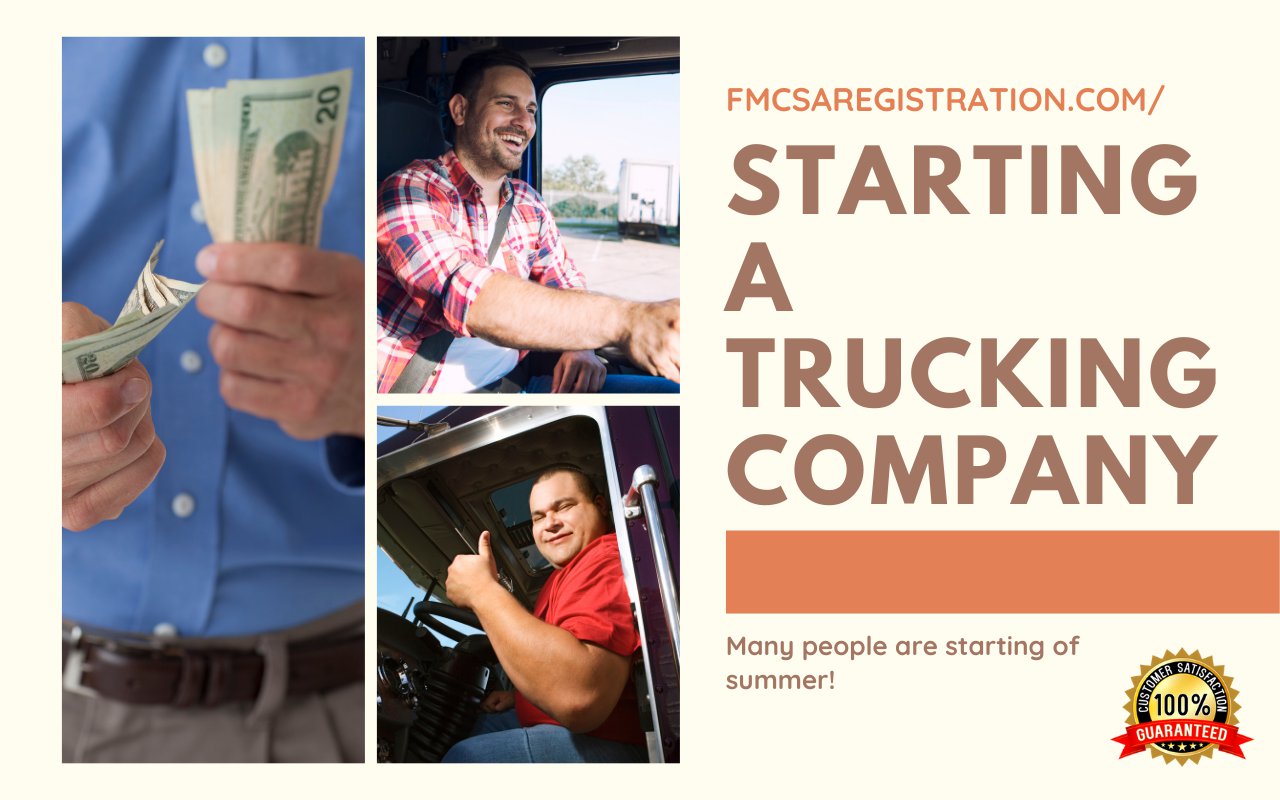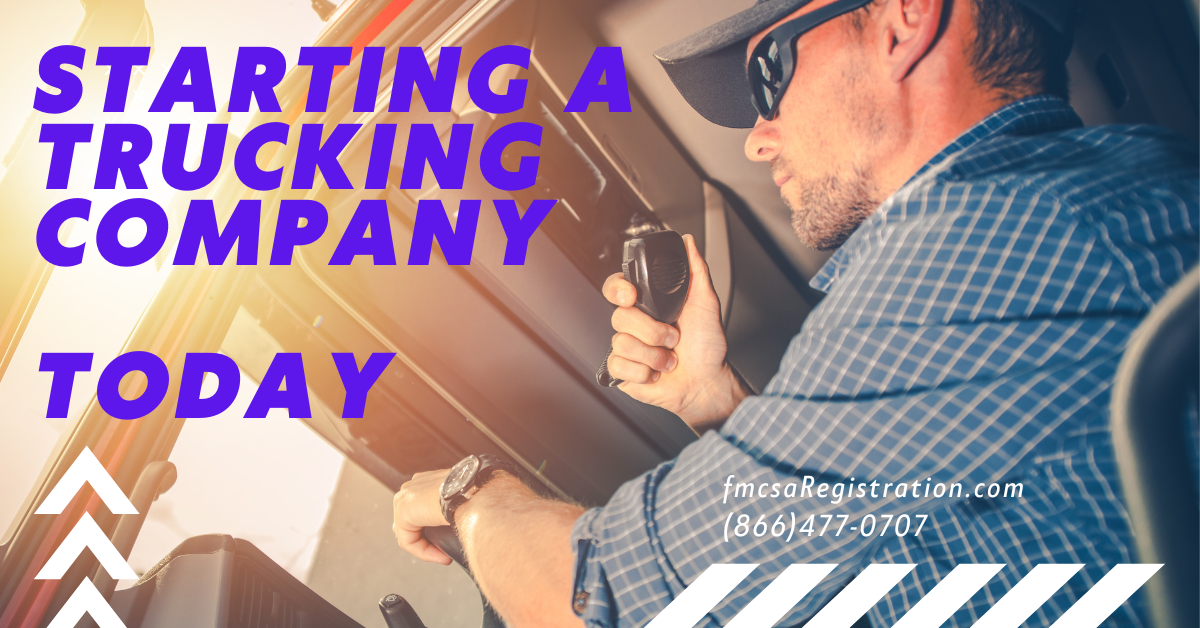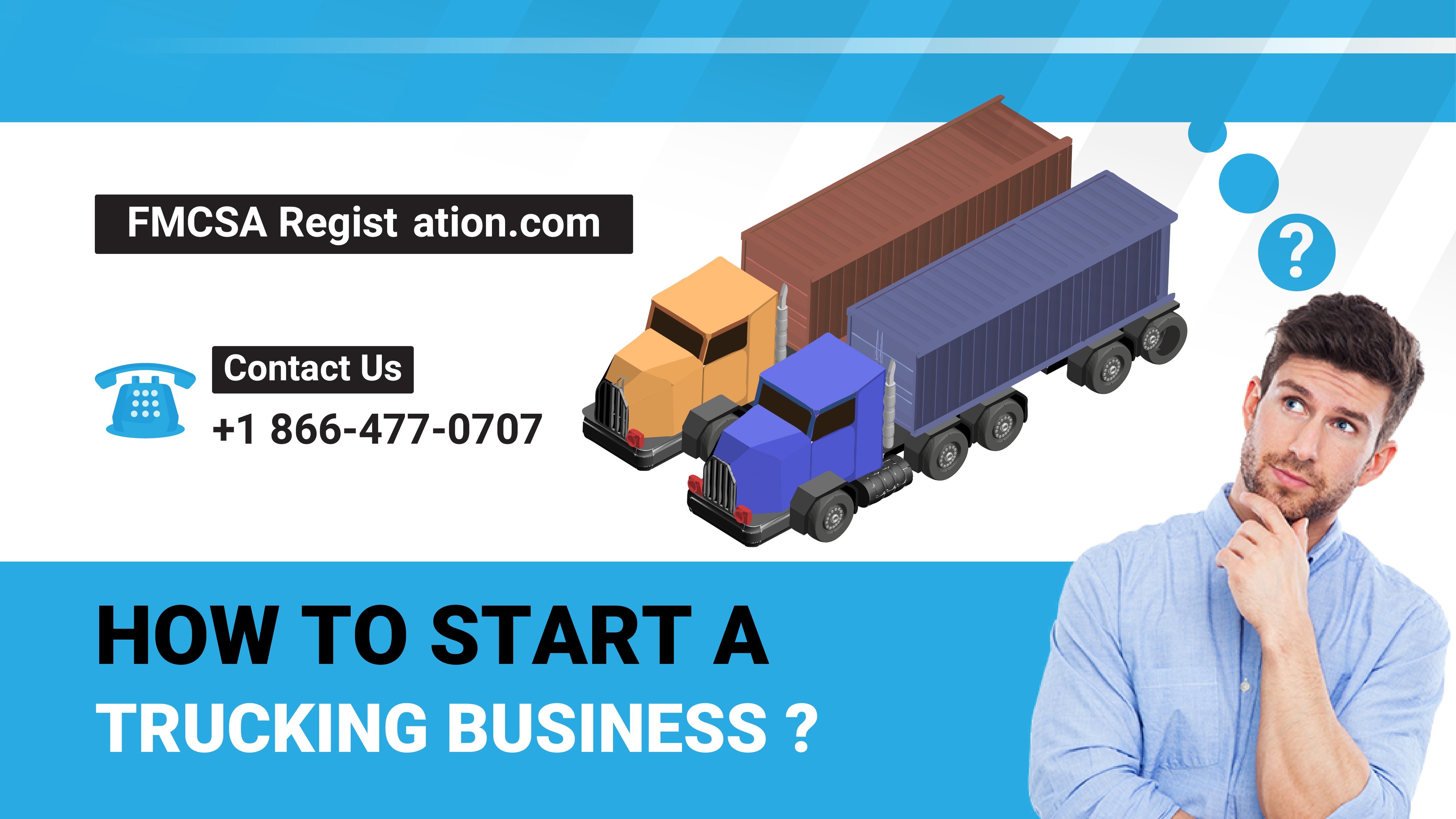Starting a Trucking Company Correctly
$593.00 Only
$593.00$593.00 Only
Product Code: 14
Product Description:
Legally establish your trucking company | Press yellow button
Paperwork, and forms with package are provided after signing up
On average Truck Owner Operator Salary is $112,717
After getting licensed Find loads and grow your business
The 2024 Entrepreneur's Guide to Trucking: Start Your Journey Today
Starting a trucking company in 2024 embodies the spirit of American entrepreneurship. Here's why venturing into the trucking industry could be your next big move:
- Flexibility & Freedom: Running your own business means you're in control. Choose your niche, set your schedule, and steer your company toward success.
- Financial Incentive: The financial rewards can be significant with diligent management and a robust business plan. As demand for shipping and logistics continues to climb, so does the profit potential.
- Endless Growth Opportunities: The trucking industry is diverse and expansive. Entrepreneurs can find their niche in local delivery services, long-haul trucking, or specialized logistics.
Embarking on this journey requires passion, perseverance, and practical planning. Success in the trucking industry hinges on understanding the open road and the nuances of business operations, regulatory compliance, and financial management. FMCSA Registration is your ally in navigating these waters, offering services tailored to new and growing trucking businesses. Whether obtaining necessary permits or ensuring regulatory compliance, our expertise can propel your entrepreneurial dream into a thriving reality. Our Start Trucking Company package includes everything you need to get you started!
Crafting Your Initial Business Plan
A solid foundation is paramount before you hit the road with your trucking business. Crafting a detailed business plan is your roadmap to success, guiding you through the ebbs and flows of the transportation industry.
Importance of a Thorough Business Plan
A well-structured business plan is not just a formality; it's the backbone of your venture. It serves multiple purposes:
- Roadmap to Success: Just like a map guides a driver, your business plan outlines your journey from startup to growth, helping you navigate through challenges.
- Financial Planning: It lays out the economic landscape, enabling you to plan investments, forecast revenue, manage expenses, and ensure profitability.
- Attract Investors: A compelling business plan is your best pitch to investors and lenders, showing them why your trucking company is a worthy investment.
- Regulatory Compliance: It helps ensure you've considered all regulatory requirements, setting you on the path to compliance.
Key Sections to Include in Your Trucking Business Plan
Putting together a business plan might seem daunting, but focusing on these core sections will set you on the right path:
- Executive Summary: The elevator pitch of your plan, summarizing critical points like business goals, mission, and vision.
- Market Analysis: Insight into the trucking industry, including trends, competition, and your target market.
- Services Offered: A detailed description of the services your company will provide, such as long-haul, local deliveries, or specialized freight.
- Operations Plan: How your company will operate, including details on your fleet, technology used for management, and operational strategies.
- Marketing & Sales Strategy: Your plan for attracting customers and building relationships. Highlight your competitive edge and how you'll communicate your value proposition.
- Financial Projections: Detail your startup costs, projected income, and cash flow. Include balance sheets and income statements to present a clear financial picture.
- Regulatory Compliance: Outline your strategy for staying compliant with industry regulations, emphasizing how you will navigate the complexities of permits and licenses. It's crucial to mention support from entities like FMCSA Registration, which can simplify this process by offering packages tailored to your needs.
With each section carefully thought out and written, you're planning for your business's launch and its long-term success in the vibrant trucking industry. Remember, a journey of a thousand miles begins with a single step; let your business plan be that step.
Legal Foundations: Registering & Structuring Your Business
Laying the legal groundwork for your trucking company is crucial. It ensures your business operates within the boundaries of the law, protecting you and your assets. Let's steer through choosing the correct business entity, registering your trucking company, and obtaining the necessary permits and licenses. These and others are included in our trucking company package.
Choosing the Right Business Entity
The structure of your business influences everything from day-to-day operations to taxes and how much your assets are at risk. Consider these common types:
- Sole Proprietorship: Simple and requires minimal paperwork. However, it doesn't offer personal liability protection.
- Limited Liability Company (LLC): Offers liability protection, flexible tax options, and simplicity in management. It's a popular choice among small to medium-sized businesses.
- Corporation (S or C corp): Suitable for more extensive operations that aim to raise capital through the stock. It offers liability protection but comes with more regulatory and tax requirements.

Steps to Register Your Trucking Company
- Choose a Business Name: Ensure it's unique and resonates with your brand identity.
- Register with the State: Requirements vary, so visit your state's website or contact us to guide you.
- Apply for an EIN: It's like a social security number for your business, necessary for tax purposes.
- File the Necessary Paperwork, Such as the Articles of Organization for an LLC or Articles of Incorporation for a corporation.
Obtaining Necessary Permits and Licenses
Trucking companies require several specific permits and licenses to operate legally:
- USDOT Number: Acts as a unique identifier when collecting and monitoring your company's safety information.
- MC Authority: Required for interstate commerce, it grants you the authority to transport goods across state lines.
- State-Specific Permits: Some states require additional permits for intrastate transport.
- IRP Tags & IFTA Decals: Necessary for trucks traveling across multiple states or provinces.
Navigating this landscape can be complex. Leveraging the expertise of FMCSA Registration simplifies the process. We offer packages tailored to the needs of new trucking companies, assisting with obtaining your DOT and MC numbers, ensuring compliance, and more.
Financial Planning: Funding and Expenses
A trucking company's engine is powered by more than just diesel; financial fuel is just as essential. Understanding and planning your initial funding and ongoing expenses will prepare you for the long haul. Let's break down the economic roadmap for launching your trucking company in 2024.
Overview of Startup Costs
Starting a trucking company involves various expenses that you need to factor in:
- Trucks: The cornerstone of your operation. The cost varies widely depending on whether you buy new, used, or lease.
- Insurance: Essential and can be substantial, covering liabilities, cargo, and vehicle damage.
- Licenses & Permits: Includes the cost of obtaining a USDOT number, MC authority, and state-specific permits.
- Operational Costs: From office space (if needed) to software for fleet management.
- Employee Salaries: If you plan to hire drivers or administrative staff from the start.
Strategies for Securing Startup Funding
Securing the capital to fuel your startup can be challenging, but there are multiple paths you can explore:
- Personal Savings: Using your funds is the most straightforward method, though it carries personal risk.
- Bank Loans: These are traditional but require a solid business plan and often collateral.
- Investors: Finding business partners or investors can provide the necessary capital and additional expertise.
- Grants: Some government and private grants are available for transportation startups, worth researching for potential funding without the need to repay.
Managing Ongoing Expenses and Revenue Strategies
Once your trucking company is up and running, effectively managing your expenses and revenue becomes crucial:
- Efficiency is Key: Maximizing fuel efficiency, optimizing routes, and regular vehicle maintenance can significantly cut costs.
- Diversify Your Services: Offering specialized transport services can attract higher-paying contracts.
- Control Overhead Costs: Keeping a tight rein on administrative expenses and leveraging technology for operations management.
- Dynamic Pricing Model: Adjusting your pricing based on demand, competition, and operational costs can enhance profitability.
- Regular Financial Analysis: Monitor your financial health and adjust your strategies as needed.
Starting and running a trucking company demands significant financial planning and management. Through a thorough understanding of startup costs, exploring various funding options, and effective management of ongoing expenses, your trucking business can survive and thrive in 2024 and beyond.
With FMCSA Registration support services, like obtaining necessary permits and licenses, you can ensure a smooth start, allowing you to focus on your business's financial health and growth. Remember, a successful trucking company is not just about moving goods; it's about wisely managing resources and precisely navigating the economic landscape.

Equipment & Operations
The backbone of your trucking company isn't just the service you offer but the equipment that enables you to deliver. Making informed decisions about your fleet and understanding the operational do's and don'ts are pivotal for your success. Let's navigate the crucial considerations for your equipment and operations.
Deciding Between Buying & Leasing Trucks
Regarding acquiring trucks, you have two primary options: buying or leasing. Both have their benefits and drawbacks:
Buying:
- Pros: Full ownership, no restrictions on customization or mileage, and potential long-term cost savings.
- Cons: Higher upfront costs, maintenance responsibility, and depreciation risk.
Leasing:
- Pros: Lower initial investment, often includes maintenance, allows for updating to newer models more frequently.
- Cons: No equity buildup, may have mileage restrictions, and you must return the truck in good condition.
Essential Trucking Equipment Beyond the Vehicle
Your trucks are just the start. Equipping them (and your company) with the right tools is essential for efficiency and safety:
- Telematics Systems: For real-time tracking, fuel management, and driver performance monitoring.
- Safety Gear includes reflective vests, cones, and emergency kits for breakdowns or accidents.
- Maintenance Tools: Basic tools for on-the-go repairs can save time and money.
- Cargo Securing Equipment: To meet safety standards and prevent load shifting.
Investment in the right equipment will amplify your operational capabilities and safety compliance.
Operational Considerations for New Trucking Companies
Starting a trucking company comes with a steep learning curve. Here are critical operational considerations you should not overlook:
- Compliance: Staying up-to-date with FMCSA regulations is critical. Services like those offered by FMCSA Registration can help you navigate the maze of compliance, ensuring your operations meet federal and state requirements.
- Efficient Route Planning: Leveraging GPS and routing software can optimize travel times, reduce fuel consumption, and improve delivery schedules.
- Regular Maintenance: Proactive vehicle maintenance not only extends the life of your trucks but also prevents costly breakdowns and ensures safety on the road.
- Driver Management: Recruiting skilled drivers and investing in their training can significantly impact your operation's efficiency and safety.
Starting with the right equipment and a solid understanding of operational best practices sets the stage for a successful trucking business. By carefully weighing the decision between buying and leasing, equipping your operation beyond just the vehicles, and paying close attention to these operational essentials, you're not just preparing to enter the trucking industry but gearing up to excel in it.
Insurance, Compliance & Safety
Protocols
When launching a trucking company, safeguarding your assets, ensuring compliance with regulatory requirements, and prioritizing safety are non-negotiable. These three pillars – insurance, compliance, and safety – are fundamental to the operation and success of your business. Let's navigate these critical aspects.

Types of Insurance Coverage Needed
A well-covered trucking business is a resilient one. Consider these essential insurance policies:
- Liability Insurance: Covers damages and injuries to others in case of accidents. It's mandatory.
- Cargo Insurance: Protects the goods you're transporting in case of loss or damage.
- Physical Damage Insurance: For repairs or replacement of your trucks in case of an accident, theft, or natural disaster.
- Workers' Compensation: Provides medical benefits and wage replacement to injured employees.
Selecting the right mix of coverage ensures you're protected from various risks on and off the road.
Ensuring Compliance with FMCSA & Other Regulatory Bodies
Staying compliant with the Federal Motor Carrier Safety Administration (FMCSA) and other regulatory bodies is critical. Here's how you can keep on track:
- Stay Informed: Stay updated with current regulations through reliable sources or partners like FMCSA Registration.
- USDOT & MC Numbers: Register to obtain these essential identifiers for your business.
- Log Books and ELDs: Maintain accurate logbooks (electronic logging devices) for all your drivers, adhering to HOS (Hours of Service) regulations.
- Regular Inspections and Audits: To ensure compliance, prepare for and participate in regular inspections and audits.
Importance of Establishing Safety Protocols
Establishing and maintaining rigorous safety protocols ensures compliance and protects your employees, assets, and the public.
Steps to consider include:
- Driver Training: Continuously educate your drivers on safe driving practices and compliance.
- Vehicle Maintenance: Implement a regular vehicle maintenance schedule to prevent breakdowns and ensure safety.
- Safety Meetings: Discuss safety issues, updates, and improvements regularly.
- Compliance Checks: Routine checks to ensure adherence to safety and regulatory standards.
Adopting a culture centered on safety fosters a positive work environment, minimizes accidents, and reduces insurance claims.
By understanding and applying the right insurance coverage, maintaining stringent compliance with regulatory requirements, and putting robust safety protocols in place, you're building a solid foundation for your trucking company. Remember, the road to success in the trucking industry is paved with precaution and compliance. With support from FMCSA Registration for navigating bureaucratic waters, focus on what you do best — moving the world one load at a time.
Scaling Your Business: Fleet Management and Hiring
Growth is a pivotal phase in the lifecycle of your trucking company. Effectively managing your fleet and constructing a skilled team are central to scaling your operations. Embrace these strategies to navigate through the expansion phase seamlessly.
Strategies for Expanding Your Fleet
As demand increases, so does the need for a more extensive fleet. Here are a few strategies to consider for expansion:
- Evaluate Leasing & Buying: Depending on your financial position, leasing additional trucks is more flexible and less
capital-intensive than purchasing new ones outright. - Invest in Technology: Utilize fleet management systems to optimize the usage of your current fleet before adding more trucks. Sometimes, efficiency can accommodate growth without physical expansion.
- Maintenance Schedule: Implementing a strict maintenance schedule can prolong the life of your current fleet, making expansion more manageable and cost-effective.
Expanding your fleet requires careful consideration of your company's current status and aspirations. Make informed decisions to ensure that growth is sustainable.
Hiring Considerations and Maintaining a Skilled Team
Your drivers are the heart of your trucking company. Here's how to ensure you have the right team on board:
- Comprehensive Screening: Conduct thorough background checks and drug testing to ensure safety and reliability.
- Competitive Compensation: Offer competitive wages and benefits to attract and retain top talent.
- Continuous Training: Invest in continuous education and training to update your team on safety protocols and driving techniques.
- Positive Culture: Foster a company culture that values teamwork, safety, and excellence. Happy employees are critical to your company's success.
A skilled and dedicated team is indispensable as you scale your trucking business. Your commitment to hiring the right people and investing in their development can significantly impact your company's future.
Scaling a trucking company involves multifaceted fleet management and workforce development strategies. By methodically expanding your fleet based on careful analysis and cultivating a professional, skilled team, you position your business for sustainable growth and success in the competitive trucking industry.

Customer Reviews
Great Services!
FMCSA Registration LLC has been a life-saver for my company. They ensure that my employees comply with all FMCSA regulations. We haven’t been fined or penalized in many years. And I owe that to the great folks at FMCSA Registration LLC. They are the only third-party registration service that I trust.
My organization has been securing DOT Numbers, MC Numbers, UCR Registration, and all other FMCSA requirements from FMCSA Registration LLC for well over a decade. Why? Their services are lightning-fast, their customer service is excellent, and they go the extra mile to make sure that we maintain full compliance at all times. A+++.
Navigating Challenges & Leveraging Opportunities
Common challenges for new trucking businesses
Launching your trucking company is an exciting venture, but it comes with several hurdles like any business. Knowing these challenges can help you prepare and navigate them more effectively.
- Compliance & Regulation: Keeping up with the Federal Motor Carrier Safety Administration (FMCSA) regulations is crucial. FMCSA Registration is ready to assist with your compliance needs. Visit fmcsaregistration.com for support in ensuring you meet all regulatory requirements.
- Capital & Cash Flow: Initial startup costs and ongoing expenses can strain new businesses. Creating a detailed financial plan is essential to managing these challenges.
- Finding Customers: Building a client base takes time and effort. Networking and establishing a solid marketing strategy are crucial to attracting customers.
- Maintenance & Upkeep: Regular fleet maintenance is necessary but can be costly. Consider setting aside a maintenance fund to address unexpected repairs.
- Driver Recruitment & Retention: Hiring skilled drivers and keeping them can be challenging. Offer competitive wages and benefits to attract and retain top talent.
Despite these challenges, new trucking businesses can leverage numerous opportunities in the current market to their advantage.
Potential opportunities in the current market
The trucking industry constantly evolves, and staying abreast of current trends can uncover valuable opportunities for your new trucking business.
- E-commerce Boom: The exponential growth of online shopping has increased demand for shipping services. Tapping into this market can provide a steady stream of business.
- Sustainability Practices: Adopting green practices can reduce costs and appeal to environmentally conscious clients.
- Niche Markets: Specializing in a niche market, like temperature-controlled goods, can set your business apart from competitors.
- Technology Integration: Utilizing the latest technologies can improve operational efficiency and attract clients seeking innovative logistics solutions.
- Partnerships and Networking: Establishing solid alliances with other businesses in the supply chain can lead to more opportunities and mutual growth.
The road to establishing a successful trucking company might be filled with challenges. Still, with the right approach and resources, you can navigate through them and seize the opportunities awaiting in the dynamic market of 2024. Remember, FMCSA Registration supports your journey with services geared towards new trucking businesses. Visit fmcsaregistration.com to explore how we can assist you in starting your venture on solid ground.
Future-Proofing Your Trucking Company
In the dynamic world of the trucking industry, staying one step ahead isn't just an advantage—it's a necessity. Future-proofing your trucking company entails more than just keeping your fleet on the road; it involves a proactive approach to adapt to changes and seize opportunities for sustainable growth. In this section, you'll discover the importance of staying updated with industry trends and gather practical recommendations for ensuring your trucking business survives and thrives in the years to come.
Importance of Staying Updated with Industry Trends
Adapt & Overcome: The trucking landscape is continuously evolving, with regulatory changes, technological advancements, and shifts in consumer demand shaping the future of transportation. By staying informed about these trends, you can make strategic decisions that position your company for success.
Regulatory Compliance: Navigating the complex waters of FMCSA regulations can be challenging. Staying updated ensures your company remains compliant, avoiding fines and interruptions. FMCSA Registration provides comprehensive compliance solutions tailored to your needs.
Technology Integration: From telematics to autonomous vehicles, technological advancements are revolutionizing the way trucking companies operate. Embracing these technologies can improve efficiency, safety, and customer satisfaction.
Enhancing Competitiveness: Understanding market trends enables you to identify new opportunities and niches, staying competitive in a crowded marketplace. It's about being agile and responsive to changes, ensuring your services meet current and future demands.
Recommendations for Sustainable Growth and Adaptation
Invest in Your Team: The backbone of any trucking company is its people. Investing in training and development ensures your team is skilled, motivated, and prepared for the challenges ahead. A knowledgeable team can adapt to changes more easily, driving your company forward.
Safety First: Establishing robust safety protocols not only protects your drivers and assets but also improves your reputation and operational efficiency. Enhanced safety measures can lead to reduced insurance premiums and compliance risks.
Embrace Innovation: Be bold in adopting new technologies and operational strategies. Innovations in fleet management, eco-friendly practices, and customer service can set your company apart from the competition.
Build Strong Relationships: Developing strong connections with customers, suppliers, and industry partners fosters loyalty and opens up new opportunities. Regular feedback and excellent customer service are key to long-term success.
Stay Financially Astute: Understanding your company's financial health and the broader economic environment helps you make informed decisions regarding investments, expansions, and risk management. Keep a close eye on your finances and seek opportunities for strategic growth.







